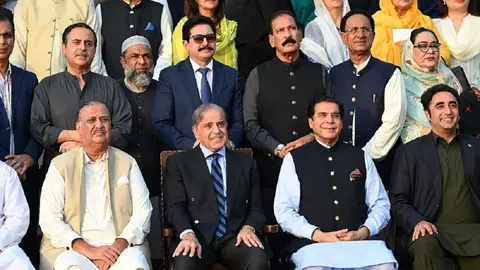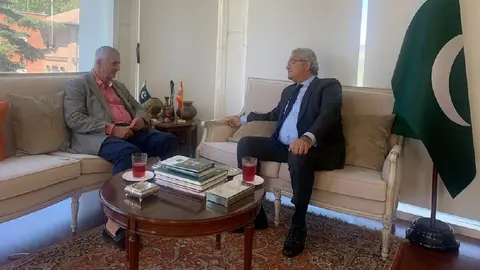Pakistan: New interim Prime Minister to be sworn in on Monday

Anwaar-ul-Haq Kakar, a little-known senator, will take the oath of office on Monday in Pakistan to officially assume his role as caretaker Prime Minister and lead the country until elections are due in a few months' time.
The new interim head of government will be sworn in on Monday evening, the country's Independence Day, in a ceremony broadcast live on television.
"I am confident in the interim prime minister's ability to organise free and fair elections," outgoing Prime Minister Shehbaz Sharif said in a farewell address to the nation late on Sunday.
The 52-year-old Kakar's first task will be to choose a cabinet to lead the country ahead of an election period that could last months.
Parliament was formally dissolved last week and elections are constitutionally due to be held within 90 days, but the weekend's release of the latest census data could delay them.
The government has indicated that the electoral commission needs time to redraw constituency boundaries as the authorities try to bring stability to the country's security, economic and political crises.

Turbulent political climate
The political climate has been turbulent since Imran Khan was removed as prime minister by a no-confidence motion in April 2022. Last weekend, the septuagenarian was sentenced to three years in prison for corruption and jailed. Mr Khan, who is also banned from standing for election for five years, has appealed his conviction.
Mr Kakar "has a limited political career and does not carry much weight in Pakistani politics," said political analyst Hasan Askari Rizvi, interviewed by AFP at the weekend.
"This may be an advantage as he does not have a strong affiliation with the major political parties," but "the disadvantage," the analyst said, "is that it may be difficult for him to address the problems he will face without the active support of the military establishment."
Last month, parliament hastily passed a law giving the interim government more power to negotiate with international bodies such as the International Monetary Fund. This is a further indication that it may remain in power for some time.
Some analysts believe this delay could give the main coalition partners, the Pakistan Muslim League-Nawaz (PML-N) and the Pakistan People's Party (PPP), time to work out a strategy against Khan's party.

The United States said on Wednesday it was following the situation in Pakistan with concern, fearing that violence could erupt on the eve of the elections.
Behind every election in Pakistan is the army, which has staged at least three successful coups since the country was forged out of India's partition in 1947.
Mr Khan enjoyed genuine popular support when he came to power in 2018, but analysts believe it was only with the blessing of the country's powerful generals, with whom he reportedly fell out in the months leading up to his ouster.










